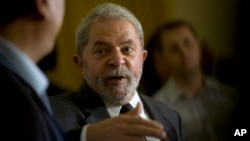Former Brazilian President Luiz Inacio Lula da Silva was charged in a money laundering investigation led by Sao Paulo state prosecutors on Wednesday, intensifying scrutiny of the politician questioned in a separate federal graft probe last week.
A spokesman for the state prosecutors declined to specify the charges, but state investigators have said they suspect Lula's family owned an undeclared beachfront apartment in the city of Guaruja.
Federal investigators echoed those allegations after they detained Lula for questioning in police custody on Friday, fanning a political crisis that has rattled his successor, President Dilma Rousseff.
Lula has denied any wrongdoing and rejected the idea that he owned the luxury condo in Guaruja built by engineering group OAS, one of the conglomerates snared in a vast corruption scandal tied to state-run oil company Petrobras.
Lula's lawyer called the charges an attempt by prosecutor Cassio Roberto Conserino to smear the former president.
"Conserino turned two visits to an apartment in Guaruja into concealed ownership," defense attorney Cristiano Zanin Martins said in a statement calling on the Supreme Court to decide if state or federal prosecutors had jurisdiction.
The charges may make it more urgent for Lula to accept, if offered, a post in Rousseff's government.
Brazilian media reported on Wednesday that Workers Party members were pressuring Rousseff to offer its founder Lula a ministerial portfolio that would shield him from possible detention.
If appointed, Lula could only be tried in the Supreme Court, placing him out of the reach of the federal judge investigating kickbacks at Petrobras.
Rousseff's minister in charge of legislative affairs, Ricardo Berzoini, said on Wednesday that Lula could join Brazil's government if he wishes.
"The ball is in his court," Berzoini told Reuters. "The government is good with it," he said.
According to two sources close to Lula, he was reluctant to join the government but pressure from his party has had some effect.
"The best chance that he has is to accept a ministry and for the trial to go to the Supreme Court so he receives a fair hearing," said one of the sources, who requested anonymity to discuss Lula's legal strategy.
The snowballing scandal puts Rousseff in a tough spot as she promises independence for investigators while trying to contain the political fallout in her Workers' Party.





